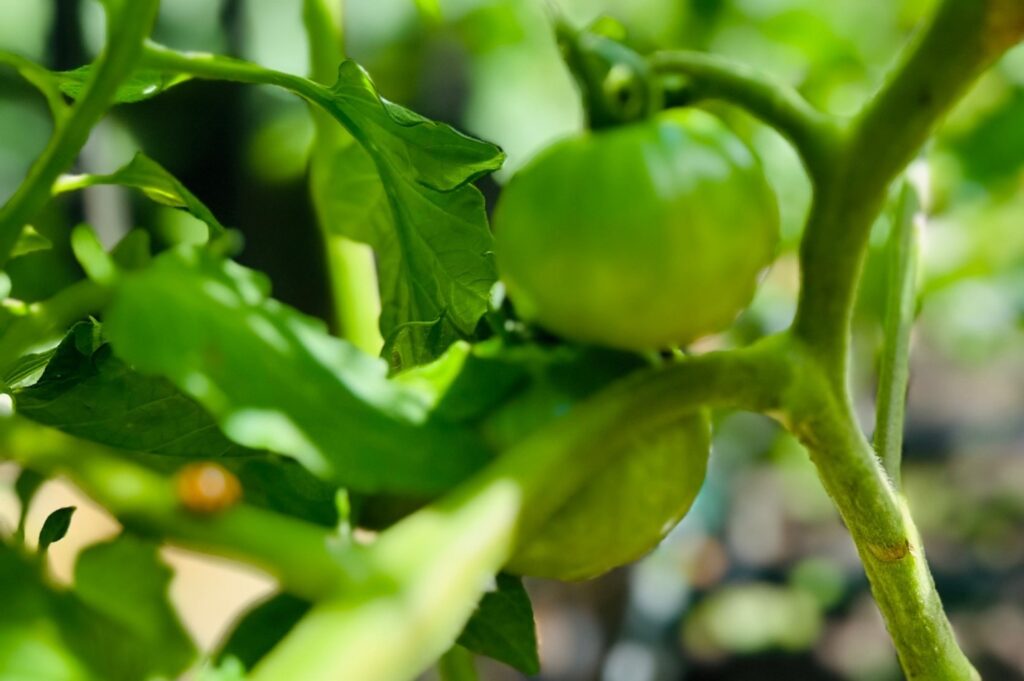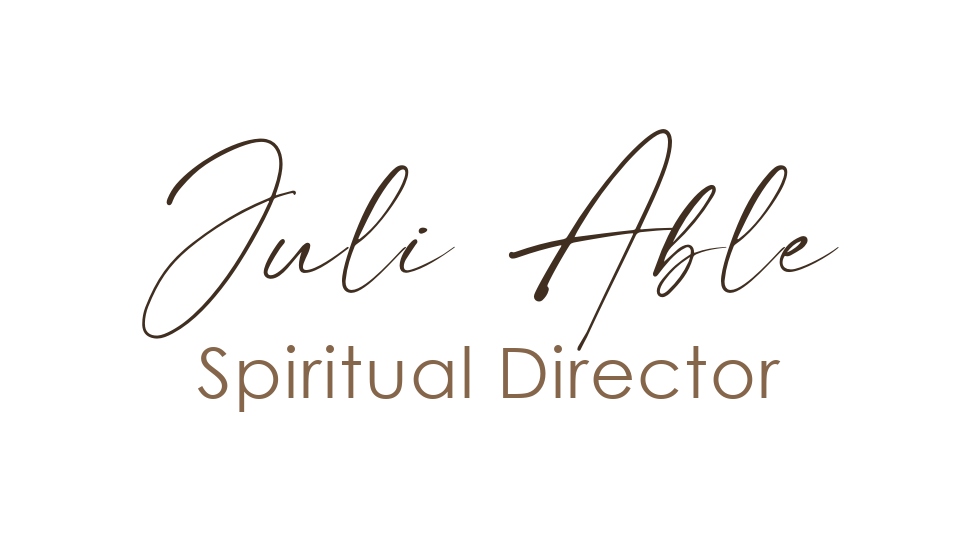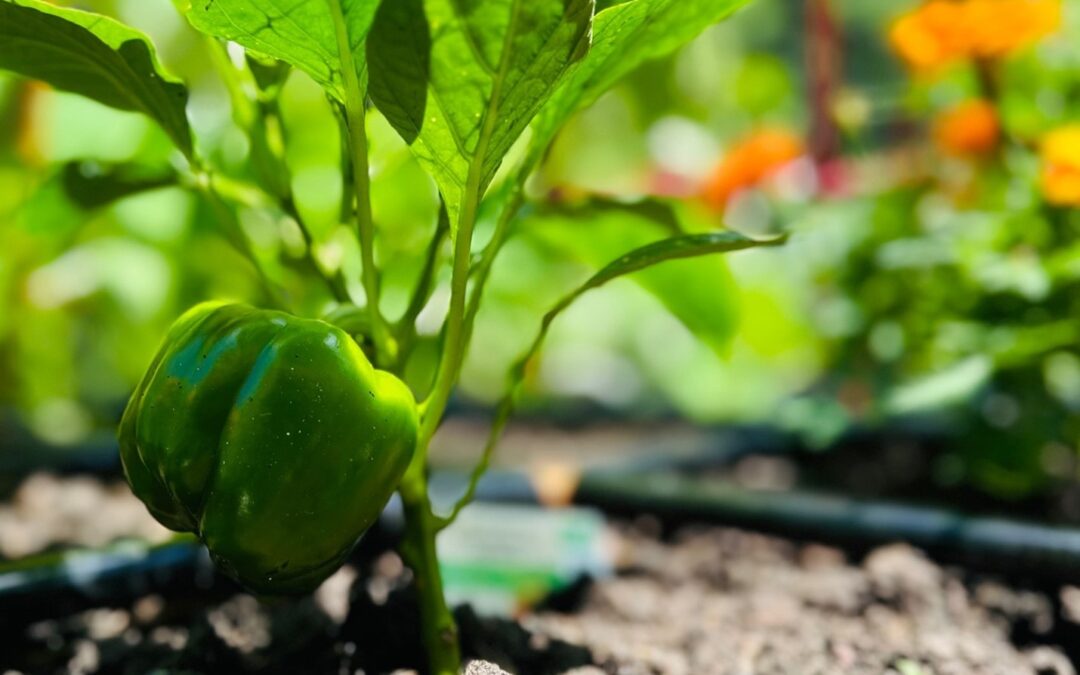Gardening is teaching me to notice the very small. Today, I marvel at a cucumber plant’s thin tendril curled in tiny ringlets around a neighboring pepper cage. Fragile and strong, it’s doing what it can to lift out of dirt and reach toward light. Removing low-lying tomato stems, I find a baby tomato hidden in the leaves J … with a big hole in its side L. There are holes in the sunflower leaves too, and the basil. I panic and want to kill something! But my friend takes it all in stride. “There will be more tomatoes,” she promises. “Just wait and see.”
With the help of a friend, I’ve planted my first vegetable garden. I check it frequently and am amazed as little shoots actually peek through the dirt. It’s science, right? You plant in good dirt and plentiful sunshine, add water as needed, and in time … things grow. It works for others; I just didn’t imagine it happening under my watch.
It strikes me that these shoots, buds, and blooms come at a time we often label “the end of the year”. This overfull month of May holds great paradox, one that’s easy to miss in our busyness: we celebrate the end (of the school year and everything that follows its cycle) and the world begins to bloom. There are new beginnings all around and within us that have been growing underground for a while. Like small, tentative shoots, they may be mostly hidden and unknown. Sometimes we are the last to see what’s happening in us.
Thomas Kelly describes the crucial inside work of a spiritual life: “Deep within us all”, he says, “there is an amazing inner sanctuary of the soul, a holy place, a Divine Center, a speaking Voice, to which we may continuously return.”[i] We engage this work with practices like silence, solitude, stillness, and meditation. With God, we till the soil, break the ground, dig holes, plant seeds, that are watered and fed with light on the inside of us.
This season of paradox can be a good time to notice our tender shoots, buds and blossoms – a good time to reflect upon the “path that’s unfolded behind us” and to “look back and see the signposts”[ii], as a poem by Lynn Unger names. I’d like to describe these signposts or shoots as Graces: gifts from God, concrete expressions – interiorly and exteriorly – of God’s love.[iii]
The invitation of this season is to notice and gather the graces[iv]. Likely it’s too early to tell exactly what they will become; so that’s not the point. We reach “the end of the year” not with finished business, but with new beginnings. These are worth celebrating. They also need tending. This is more the point. So, as I describe some of the signposts or graces that may be emerging in your life, be open to God stirring resonance and remembrance in you. Because this is not an exhaustive list, something else may come to mind. Gather those graces too. We will each have our own unique bouquet.
A grace to begin with: Gratitude and Delight. Gratitude is not a list; It’s a grace. Not a striving word, but a praying word. It can flow from relief, but it’s something more. And it always begins with attentiveness. It can break through the surface as delight – sparks of pleasure, friendship, deep joy, or playfulness[v]. Richard Foster personifies it: “God laughs into our soul and our soul laughs back into God.”[vi] Gratitude’s posture is arms wide open, heart forward, face tilted up.[vii] Sometimes “exquisite delight can mingle with a painful yearning”.[viii]
Consider the ground you’ve traveled. For what or who have you felt gratitude welling up in your heart? What does it feel like inside of you? sparks of pleasure, deep joy, playfulness, a wave of relief, a good belly laugh, something else? Maybe begin with your body: open your arms wide so your heart expands, turn your face up. As you do, what or who or where comes to mind? Gather these graces and pause to savor them.
Another grace: Compassion and Mercy – heart-felt responses to human need that flow from love within. This begins with what John of the Cross describes as “a secret and peaceful loving inflow of God.”[ix] Encounters with God’s love flow naturally inward and outward. That is what love does: It moves us. Yet this isn’t human achievement; It’s grace. As I genuinely receive love, I contain love and want to share it. This takes time. It’s slow. There is a time to receive and a time to give, and those don’t always overlap or come in quick succession. At least that’s been my experience.
When have you felt a secret and peaceful loving inflow of God? How has God loved you this year? Be as specific as you can. How is this love turning you towards or illuminating others? perhaps moving you toward others? Jesuit Priest, Greg Boyle says “The strategy of Jesus is not centered in taking the right stand on issues but rather standing with Jesus in the right place…”[x] What you see depends on where you stand. So where do you stand and with whom?[xi] Where is God stirring you to move closer? How is God helping you to see differently or deeper? Gather these graces growing in you.
Peace is another grace. Richard Foster says that often, at the same time love grows, “in slips a peace that cannot be analyzed or dissected”[xii]. He helps us recognize it – as “quiet rest … (that is) not due to the absence of conflict or worry … but rather a Presence in it. This peace is interrupted often, by a multitude of distractions … (but in time and) with tending, its quiet way wins over the chatter and clatter of our noisy hearts.”[xiii]
How has God quieted your soul this year? When have you experienced moments of quiet rest even amidst conflict or worry? Maybe this Presence felt like steady hands on tight shoulders, a soft weight cupping your frazzled head, a deep breath, long exhale, gentle breeze, warm cup of tea, or something else?
Emptiness is a surprising grace. Richard Foster describes it as “intense longing, yearning, searching … (and maybe) incomplete finding”[xiv]. John of the Cross calls this “a living thirst … the urgent longing of love.”[xv] Foster helps us recognize and receive the grace of emptiness that sometimes shows up as darkness or dryness. It complements delight, like feasting and fasting. Our souls need both to grow.[xvi]
Can you sense emptiness within, something not yet filled? So often we want to rush and fix this because it’s uncomfortable. It’s hard to let be and wait on the slow work of God. Can you simply name the empty places and longings? Here, at the end of the year, what is still unfinished, unformed? What are you hoping for?
And then there is the grace of Freedom. Again, the wisdom of Richard Foster informs us: As love intensifies, it becomes a steady flame. This “purifying fire” of God’s love can “burn out the dross in us” of stubbornness, judging, grasping, fear, and disordered attachments.[xvii] And I become freer. Kevin O’Brien S.J. recognizes: “Because I am human, I love the wrong things sometime. Or I love the right thing in the wrong way.”[xviii]
Where has God helped you see this and loosen your grip, open your hands, let go? Or where has God put a gentle finger upon a place you need to let go and trust God? Even the noticing before the release is grace. Name the places you are becoming a little more free. Name the places you want to become free-er still.
Spiritual Freedom leads to authenticity, “where what we do flows from the deepest sense of who we are”.[xix] We practice authenticity through radical honesty, and by noticing and following Jesus in his freedom (through scripture), and sometimes by breaking open, or conversely, by celebrating?[xx] Where have you practiced authenticity this year? Gather these into your bouquet of grace.
Though there are others, a last grace I’ll name is Hope. A close friend is releasing a book into the world this summer. It’s a beautiful story of hope in the midst of caring for her mom with Alzheimer’s. She recounts a place in this journey where her mom would refer to her as her sister, or her cousin, or her aunt. To which my friend writes, “No matter what (mom) called me, I could still feel her love and that became enough. It had to be. Enough, according to an old Buddhist proverb, is a feast. I just had to let go, a lot, which equaled a feast of peace, and there in that bountiful banquet of acceptance, life was beginning to carry me.”[xxi] This is hope. Hope is not optimism. Hope is not “It will be fine.” Hope takes reality seriously, finds enough, and anticipates good is coming.[xxii] And hope is grace.
Where have you encountered it this year- the generosity of enough and a current carrying you towards more life ahead? When have you rested in enough?
This shift in seasons quietly asks for a pause – to name, gather, and savor the graces. It’s not about accumulating trinkets, amassing knowledge, or making lists, but noticing shifts in my soul and marking them as gifts. As I participate by gathering the graces God supplies, it extends the movement of grace, for that is its nature.
“Out of his fullness we have all received grace in place of grace already given.” John 1:16
Grace upon grace is a current that flows under me, around me, within me. Always unfinished, always more grace coming towards me, as I tend the garden of my soul with God.
So let me be the friend that encourages you at our year-end of new beginnings: Tend to the growing graces. Feed them this summer with silence, stillness, solitude, meditation. Listen to their invitations and respond. Enter further in – one step at a time. There will be more. Just wait and see.
“For do you not see how everything that happens keeps on being a beginning, and could it not be His beginning, since beginning is in itself always so beautiful.” Rainer Maria Rilke, Letters to a Young Poet

My baby vegetables! Their smallness doesn’t disappoint; it excites me! And makes me reconsider how God feels about the small things growing in me. If you look closely, you can spot an out of focus ladybug. Another grace in the garden
Questions for Reflection:
- As you look at your life, what graces from this year do you become aware of? Consider the questions included above. Is there one grace that draws you, or conversely frustrates or confuses you? Notice what your heart prays as you sit with the unfinished and incomplete in your life. Be curious as to what God could be inviting.
- Read slowly the poem, The Path, by Lynn Ungar. What words or phrases stand out to you? What memories or emotions do they stir? How does it inform your reflection on the year behind you? What invitations does it hold for you this summer?
The Path
Life, the saying goes, is a journey,
and who could argue with that?
We’ve all experienced the surprising turns,
the nearly-impassible swamp, the meadow
of flowers that turned out not to be quite
so blissful and benign as we first thought,
the crest of the hill where the road
smoothed out and sloped toward home.
Our job, we say, is to remain faithful
to the path before us. Which is an assumption
as common as it is absurd.
Really? Look ahead. What do you see?
If there is a path marked out in front of you
it was almost certainly laid down for someone else.
The path only unfolds behind us,
our steps themselves laying down the road.
You can look back and see the sign posts—
the ones you followed and the ones you missed—
but there are no markers for what lies ahead.
You can tell the story of how
you forded the stream or got lost
on the short cut that wasn’t,
how you trekked your way to courage or a heart,
but all of that comes after the fact.
There is no road ahead.
There is only the walking,
the tales we weave of our adventures,
and the songs we sing
to call our companions on.
By Lynn Ungar [xxiii]
[i] Thomas Kelly, A Testament of Devotion, p.3
[ii] Lynn Unger, The Path, https://lynnungar.com/poems/the-path/
[iii] Kevin O’Brien SJ, “The Art of Directing the Spiritual Exercises” lecture series, April 2024
[iv] I learned this from St. Ignatius of Loyola, who instructed his students at the end of a retreat to ask God “for the gift of an intimate knowledge of all the goods which God lovingly shares with me.” David Fleming SJ, Draw Me Into Your Friendship, p. 175
[v] Kevin O’Brien SJ, “The Art of Directing the Spiritual Exercises” lecture series, April 2024
[vi] Richard Foster, Streams of Living Water, p.49-50.
[vii] Kevin O’Brien SJ, “The Art of Directing the Spiritual Exercises” lecture series, April 2024
[viii] Richard Foster, Streams of Living Water, p.50
[ix] Ibid, p.49
[x] Gregory Boyle, Tatoos on the Heart
[xi] Kevin O’Brien SJ, “The Art of Directing the Spiritual Exercises” lecture series, April 2024
[xii] Richard Foster, Streams, p. 49
[xiii] Ibid, p.49
[xiv] Ibid, p.50
[xv] Ibid, p.50
[xvi] Ibid, p.50
[xvii] Richard Foster, Streams, p.50
[xviii] Kevin O’Brien SJ, “The Art of Directing the Spiritual Exercises” lecture series, April 2024
[xix] Ibid
[xx] Ibid
[xxi] Marianne Benz, You Were Still Dancing. Look for it here: www.christmaslakecreative.com or on
Amazon
[xxii] Kevin O’Brien SJ, “The Art of Directing the Spiritual Exercises” lecture series, April 2024.
[xxiii] https://lynnungar.com/poems/the-path/

